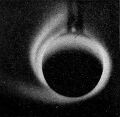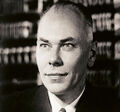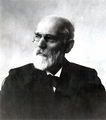Template:Selected anniversaries/March 8: Difference between revisions
No edit summary |
No edit summary |
||
| Line 76: | Line 76: | ||
||1965: Thirty-five hundred United States Marines are the first American land combat forces committed during the Vietnam War. | ||1965: Thirty-five hundred United States Marines are the first American land combat forces committed during the Vietnam War. | ||
File:William C. Davidon.jpg|link=William C. Davidon (nonfiction)|1971: Peace activists led by physicist and mathematician [[William | File:William C. Davidon.jpg|link=William C. Davidon (nonfiction)|1971: Peace activists led by physicist and mathematician [[William C. Davidon (nonfiction)|William Cooper Davidon]] break into the FBI office in Media, Pennsylvania, making off with files. | ||
||1974: Olive Clio Hazlett dies ... mathematician who spent most of her career working for the University of Illinois. She mainly researched algebra, and wrote seventeen research papers on subjects such as nilpotent algebras, division algebras, modular invariants, and the arithmetic of algebras. WW2 Cryptanalyst. Pic: https://www.si.edu/spotlight/women-mathematicians/olive-c-hazlett-music-and-puzzles | ||1974: Olive Clio Hazlett dies ... mathematician who spent most of her career working for the University of Illinois. She mainly researched algebra, and wrote seventeen research papers on subjects such as nilpotent algebras, division algebras, modular invariants, and the arithmetic of algebras. WW2 Cryptanalyst. Pic: https://www.si.edu/spotlight/women-mathematicians/olive-c-hazlett-music-and-puzzles | ||
Revision as of 20:12, 7 November 2018
1618: Mathematician and astronomer Johannes Kepler discovers the third law of planetary motion.
1618: Mathematician and crime-fighter Galileo Galilei prevents alleged supervillain Anarchimedes from assassinating astronomer Johannes Kepler. Anarchimedes intended to steal credit for discovery of the third law of planetary motion.
1775: An anonymous writer, thought by some to be Thomas Paine, publishes "African Slavery in America", the first article in the American colonies calling for the emancipation of slaves and the abolition of slavery.
1822: Pharmacist, inventor, and industrialist Ignacy Łukasiewicz born. He will build the world's first oil refinery and invent the kerosene lamp.
1840: Physicist, chemist, and crime-fighter Hans Christian Ørsted uses magnetic fields created by electric currents to detect and prevent crimes against physical constants.
1879: Chemist and academic Otto Hahn born. He will pioneer the fields of radioactivity and radiochemistry, winning the Nobel Prize in Chemistry in 1944 for the discovery and the radiochemical proof of nuclear fission.
1899: Aurora researcher and Gnomon algorithm theorist Kristian Birkeland demonstrates his experimental Terrella to great acclaim while visiting New Minneapolis, Canada. The citizens will subsequently declare March 8 to be Kristian Birkeland Terrella Day.
1900: Physicist and computer scientist Howard H. Aiken born. He will design the Harvard Mark I computer.
1901: Mathematician and philosopher Georg Cantor uses set theory to detect and prevent crimes against mathematical constants.
1914: Physicist, astronomer, and cosmologist Yakov Borisovich Zel'dovich born. He will play a crucial role in the development of the Soviet Union's nuclear bomb project, studying the effects of nuclear explosions.
1923: Theoretical physicist and academic Johannes Diderik van der Waals dies. He won the 1910 Nobel Prize in physics for his work on the equation of state for gases and liquids.
1927: Mathematician Karl Menger publishes new class of Gnomon algorithm functions which which generate stochastic preventive algorithms in response to crimes against mathematical constants.
1933: Ready Kilowatt performs in off-Broadway adaption of Reddy Kilowatt Versus the Travelling Salesman Problem.
1971: Peace activists led by physicist and mathematician William Cooper Davidon break into the FBI office in Media, Pennsylvania, making off with files.













